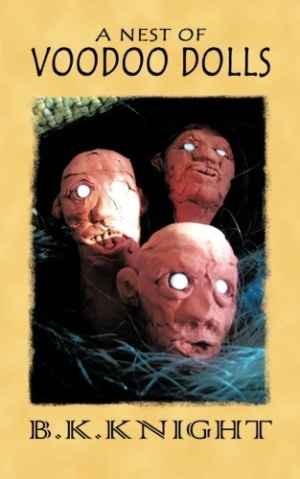A Nest of Voodoo Dolls
B. K. Knight’s five years of service in the Botswana Police Service adds gritty authenticity to her imaginative, yet uneven novel, A Nest of Voodoo Dolls.
The protagonist, Botswana police sergeant Duski Locha, is called when a man is found dead, his body mauled and partially eaten by lions. His death seems accidental, but when Locha is visited by the dead man’s spirit, and more dead people turn up, the sergeant begins to suspect murder. The bodies appear to have been mutilated using methods similar to ritual killings, in which body parts are used to make “muti,” which is medicine. As a preacher’s daughter, Locha feels guilty for asking a witch doctor to help in her investigation and her love life. Things get even worse as Locha’s modern world of cell phones and “clubbing” crosses over into the world of “traditional” magic and ritual murder.
A Nest of Voodoo Dolls is an imaginative mystery story that contains aspects of romance and police procedural novels. It also gives insight into the current sociopolitical atmosphere in Botswana. For example, Knight writes, “ordinary Zimbabweans were bearing the brunt of their country’s political and economic crisis. Legal and illegal immigrants were flooding neighboring countries, particularly Botswana … were becoming increasingly intolerant of their less fortunate neighbors.”
The novel’s descriptions of various dysfunctional relationships and interactions between men and women is often apt and entertaining, in the way reality television shows the worst of people for the viewer’s amusement and distraction. Yet the narrative is uneven and bogs down. It is difficult to discern whether it is a mystery-thriller or a romance novel with little romance. None of the men are likable; they’re all portrayed as cheats and liars. The women are either opportunists and promiscuous to a fault, insane, or emotionally and physically broken. The main character, Locha, has a biting edge and comes close to self-sabotage in her personal life, but she is comfortable and confident at work.
All the plot points, no matter how disparate they may seem, tie together neatly, if somewhat predictably. There are a few typos in the text, but they don’t significantly detract from the story.
Knight shows the fallible side of law enforcement, perhaps too much for some readers. A few of Locha’s fellow officers sleep while on duty. They also embrace stereotypes and are unashamed of their ignorance and bigotry. Locha has similarities to the dark humor of Janet Evanovich’s Stephanie Plum, particularly when it comes to her on-again, off-again romantic relationships and her evolution as a success in a job held predominantly by men. Like Plum’s ability as a bounty hunter, Locha has a knack and mind-set for law enforcement and shows determination to better her prowess.
If Knight continues to apply her police experience to more novels about Locha and fleshes out her characters more, she might rival Alexander McCall Smith’s character Precious Ramotswe of The No. 1 Ladies’ Detective Agency series, which is also set in Botswana.
Reviewed by
Lee Gooden
Disclosure: This article is not an endorsement, but a review. The publisher of this book provided free copies of the book and paid a small fee to have their book reviewed by a professional reviewer. Foreword Reviews and Clarion Reviews make no guarantee that the publisher will receive a positive review. Foreword Magazine, Inc. is disclosing this in accordance with the Federal Trade Commission’s 16 CFR, Part 255.

